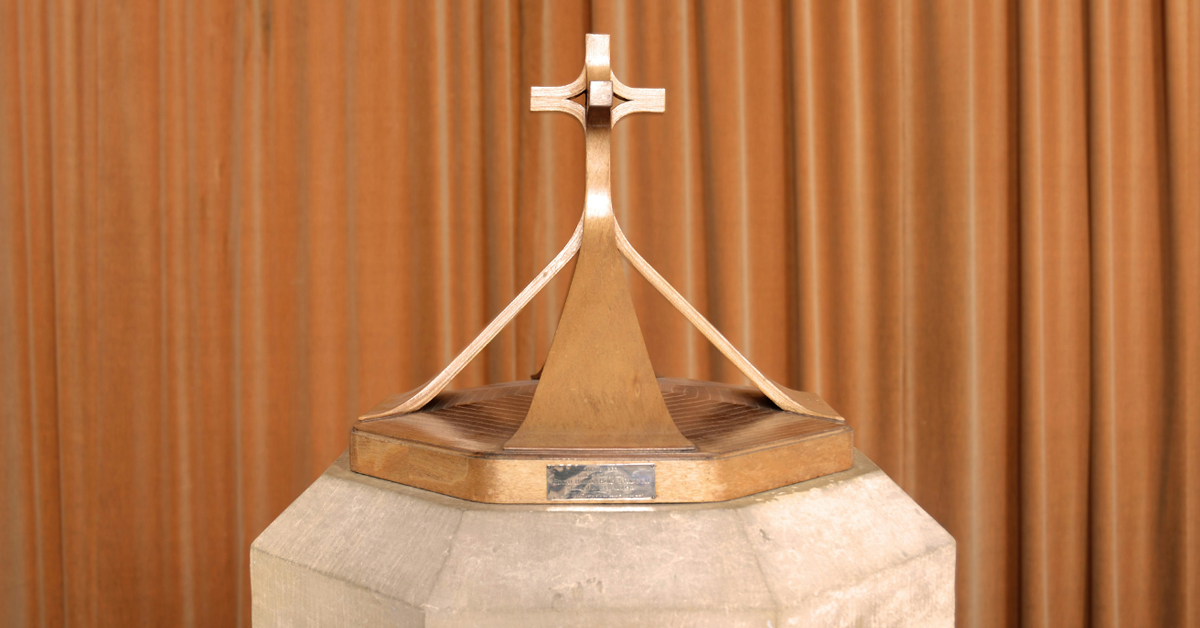By Andy Schuster
TE, Central Carolinas Presbytery
The 2024 General Assembly of the EPC considered a motion to amend the Book of Order to explicitly require baptism for admission to the Lord’s Supper. After considerable debate, the motion failed. This decision marked a serious departure from universal church teaching and the Reformed tradition.
The Westminster Confession warns that it is a “great sin to condemn or neglect” baptism (WCF 28.5). Through the sacraments, God offers tangible signs of his favor. Baptism and the Lord’s Supper are how God defines and distinguishes the church. The Reformed faith teaches, “Sacraments are holy signs and seals of the covenant of grace, directly instituted by God, to represent Christ and his benefits and to confirm our interest in him: as also, to put a visible difference between those who belong to the Church and the rest of the world; and solemnly commit them to the service of God in Christ, according to his Word” (WCF 27.1).
What is the church? The church is the body of Christ here on earth (Ephesians 4:11-16). The word for church (ekklesia) is a compound of two Greek words: “to call” and “out.” A church is the assembly of individuals who have been called out of the world through the gospel, which declares Jesus to be the Son of God and commands all to repent and believe in him.
As heirs of the Reformation, we believe salvation is by faith alone. God’s work, rather than our response to it, is the main thing. However, baptism is the outward and necessary sign of our faith. While it may be possible to be saved apart from the sacrament of baptism (e.g., thief on the cross), this is not normative. Nor should it ever be encouraged by the church. One cannot be joined to the visible church without baptism, and one cannot rightly partake in the Lord’s Supper without being baptized. Joining precedes full access, a pattern first established in the life of Abraham.
The Old Testament Paradigm
God first called Abraham out of idolatry to follow him (Genesis 12), and God promised to bless Abraham and make him a blessing through a promised son. God established a covenant — a relationship — with Abraham. Like all covenants, keeping it led to blessing and breaking it led to curses. At one point. Abraham struggled with assurance of God’s promises to him, and in Genesis 17 God gave Abraham the sign of circumcision that all the males in Abraham’s house were commanded to receive. In fact, circumcision would be required of any who wanted to be part of the Abrahamic blessing. As God said, “Any uncircumcised male who is not circumcised in the flesh of his foreskin shall be cut off from his people; he has broken my covenant” (Genesis 17:14). The individual had to receive the sign/mark of the covenant in order to enter it and be eligible for its blessings.
More than 430 years later, God delivered the people of Israel out of the bondage of Egypt. To confirm the Israelites’ identity as God’s special people, he gave them the Passover. Passover required a lamb to be slaughtered for each household, the lamb’s blood had to be applied to the doorposts of the home, and the flesh was to be eaten by all members (Exodus 12). The observance of Passover distinguished the Israelites from the Egyptians — those without blood on their doorposts suffered the judgment of God.
Could anyone who wanted to escape judgment participate in the Passover? No, only those who first joined Israel through circumcision could eat. God told Moses, “If a stranger shall sojourn with you and would keep the Passover to the Lord, let all his males be circumcised. Then he may come near and keep it; he shall be as a native of the land. But no uncircumcised person shall eat of it” (Exodus 12:48). If someone recognized they were outside of the covenant and of God and wanted to join, provision was there to participate — but it started with first receiving circumcision, not Passover. The blessings of God belong exclusively to the people of God. Full access is only for those who join.
The New Testament Fulfillment
Why do circumcision and the Passover matter for Christians? God’s people in the Old Testament were marked by two signs, and this fact holds true for the church. Yet there is a better fulfillment of these two signs today. Circumcision and the Passover have blossomed into baptism and the Lord’s Supper.
- Baptism, like circumcision, initiates someone into the covenant with God and functions as a “sign and seal of the covenant of grace, of the believer’s ingrafting into Christ, of rebirth, of remission of sins, and of the believer’s yielding to God through Jesus Christ to walk in newness of life” (WCF 28.1).
- The Lord’s Supper, like Passover, is participation in the covenant with God, as participants “by faith…spiritually receive and feed on Christ crucified and on all the benefits of his death” (WCF 29.7).
Baptism corresponds to birth/adoption into God’s family, and the Lord’s Supper corresponds to eating at the family table. Only those who have joined the body of Christ are free to participate in the meal. Stated differently, the Lord’s Supper is only for Christians, and anyone who desires to eat at the Lord’s Table must first become a Christian.
Consider how the Bible defines the word Christian. This word only appears three times in the New Testament — Acts 11:26, Acts 26:28, and 1 Peter 4:16. Acts 11:26 says, “And in Antioch the disciples were first called Christians.” A Christian, therefore, is a disciple. What is a disciple? Jesus said, “Go therefore and make disciples of all nations, baptizing them in the name of the Father and of the Son and of the Holy Spirit, teaching them to observe all that I have commanded you. And behold, I am with you always, to the end of the age” (Matthew 28:19-20). A Christian is, by definition, a disciple, who has been baptized and is being trained to obey all that Jesus commanded. Biblically speaking, there is no such thing as a non-baptized Christian.
For those who have been baptized into Christ’s body (1 Corinthians 12:13), all the benefits of Christ are available. Jesus taught that unless we abide in him, we can do nothing, and that is why we must remain united to Christ the same way a branch stays connected to the vine (John 15:4-5). The Lord’s Supper is one of the ordinary means by which Christians abide in Jesus. Jesus said, “Whoever feeds on my flesh and drinks my blood has eternal life, and I will raise him up on the last day” (John 6:54). Paul taught in 1 Corinthians 10:16, “The cup of blessing that we bless, is it not a participation in the blood of Christ? The bread that we break, is it not a participation in the body of Christ?”
However, when we participate in communion we must do so in a worthy manner. Paul warned, “For anyone who eats and drinks without discerning the body eats and drinks judgment on himself” (1 Corinthians 11:29). Those who eat at the Lord’s Supper while failing to “discern” bring judgment on themselves, not blessing. What does it mean to “discern” the body? It means, at a minimum, that communion is for those who belong to the body of Christ, the church, and that requires baptism. It is utterly inappropriate (even dangerous!) to claim the benefits of the covenant while remaining outside of it. Full access is only for those who have joined. Non-Christians should not be eating at the Lord’s Table. Instead, they should first become baptized members of the visible body of Christ so that they can eat the Lord’s Supper in a worthy manner.
An Elder’s Responsibility
No doubt some will think of Christians they know who believe baptism is unnecessary. On the floor of the 2024 General Assembly, the concern was raised that those who have different traditions about baptism would be alienated from the Lord’s Table if baptism was upheld as a prerequisite for eating at the Lord’s Supper. How should we respond to this objection?
In Mark 7:9, Jesus rebuked the Pharisees who were offended at his indifference to their traditions, saying, “You have a fine way of rejecting the commandment of God in order to establish your tradition!” Jesus did not accommodate traditions that violated the Word of God, he rebuked them.
Jesus commanded us to baptize and teach disciples. Jesus asked in Luke 6:46, “Why do you call me ‘Lord, Lord,’ and not do what I tell you?” Yes, there are people who claim to be Christian and actively ignore or violate his clear command; this is nothing new. However, those who ignore God’s Word should not be catered to. Rather, they should be instructed in the teaching of Scripture.
Furthermore, the Book of Order 18.3.A underscores that it is the session’s responsibility “to oversee the worship of the congregation,” which includes the administration of the sacraments. Elders cannot afford to ignore the vital question of who receives the Lord’s Supper. Rather they must biblically address this matter, ensuring that their practice aligns with the clear teachings of Scripture.
Paul warned Timothy, “Preach the word; be ready in season and out of season; reprove, rebuke, and exhort, with complete patience and teaching. For the time is coming when people will not endure sound teaching, but having itching ears they will accumulate for themselves teachers to suit their own passions” (2 Timothy 4:2-3). Too many ministers are afraid of offending people and think little of offending God. May God raise up ministers who are unashamed of God’s Word and preach and teach with clarity, urging all who desire the fullness of salvation, “to repent and be baptized” (Acts 3:38) so they can eat at the Lord’s Table and receive his blessing.


Leave a Comment